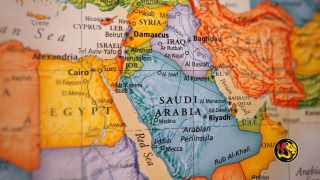
By Stefan J. Bos, Chief International Correspondent Worthy News
JERUSALEM (Worthy News) – The ability of the Israeli military and its allies to shoot down 99 percent of hundreds of drones and missiles fired by Iran toward Israel was the culmination of years of U.S.-backed efforts in the region, officials said Monday.
After several false starts and minimal progress, there was progress towards breaking down political and technical barriers that thwarted military cooperation between Israel and the Sunni Arab governments.
But with Iran seen as threatening stability in the region, the effort gained momentum after the 2020 Abraham Accords brokered by the then President Donald J. Trump’s administration.
The Accords established formal ties between Israel, the United Arab Emirates, and Bahrain, forming the basis for broader regional cooperation.
And instead of a Middle East version of the NATO alliance, the U.S. focused on less formal regionwide air-defense cooperation to blunt Tehran’s growing arsenal of drones and missiles, The Wall Street Journal newspaper reported Monday.
Once Iran used those weapons in a highly anticipated strike against Israel, the Jewish nation and its allies were prepared to act.
As hundreds of Iranian drones and missiles winged across the Middle East Saturday night and early Sunday local time, a defensive line of radars, jet fighters, warships, and air-defense batteries from Israel, the U.S., and a half dozen other countries were ready to intervene.
INTERCEPTING DRONES
Israeli and U.S. forces intercepted most of the Iranian drones and missiles.
But they could do so in part because Arab countries quietly passed along intelligence about Tehran’s attack plans, opened their airspace to warplanes, shared radar tracking information, or, in some cases, supplied their forces to help, officials said.
After further talks with the U.S., the United Arab Emirates and Saudi Arabia agreed privately to share intelligence. At the same time, Jordan said it would allow the use of its airspace by the U.S. and other countries’ warplanes and use its aircraft to assist in intercepting Iranian missiles and drones, the officials said.
Two days before the attack, Iranian officials briefed counterparts from Saudi Arabia and other Gulf countries on the outlines and timing of their plan for the large-scale strikes on Israel so that those countries could safeguard airspace, The Wall Street Journal reported.
The information was apparently passed along to the U.S., giving Washington and Israel crucial advance warning.
With an Iranian attack all but certain, the White House then ordered the Pentagon to reposition aircraft and missile-defense resources to the region and took the lead in coordinating defensive measures between Israel and Arab governments, according to a senior Israeli official.
“The challenge was to bring all those countries around Israel” at a time when Israel is isolated in the region, the official said. “It was a diplomatic issue.”
YEARS OF PLANNING
Despite years of planning, the U.S.-led effort to help Israel in the days and hours before the Iranian attack still had reportedly overcome numerous obstacles. Chief among them were fears by Gulf countries at being seen as coming to Israel’s aid at a time when the war in Gaza badly strains relations.
Much of the cooperation Saturday night that led to the shooting down of the Iranian-directed barrage needed to be forged on the fly, officials suggested. Many details about the role played by Saudi Arabia and other key Arab governments are being closely held.
Yet it helped that the Pentagon shifted Israel from its European Command to Central Command, which includes the rest of the Middle East, in recent years, according to experts.
The move enabled greater military cooperation with Arab governments under U.S. auspices.
“Israel’s move into Centcom was a game changer,” making it easier to share intelligence and provide early warning across countries, said Dana Stroul, who until December was the most senior civilian official at the Pentagon with responsibility for the Middle East.
On Monday, The Wall Street Journal reported that as early as in March 2022, Marine General Frank McKenzie, then the top U.S. commander in the region, convened a secret meeting of top military officials from Israel and Arab countries to explore how they could coordinate against Iran’s growing missile and drone capabilities.
The talks, held at Sharm El Sheikh, Egypt, marked the first time that such a range of ranking Israeli and Arab officers met under U.S. military auspices to discuss countering Iran.
“The Abraham Accords made the Middle East look different…because we could do things not just under the surface but above it,” a senior Israeli official was quoted as saying.
Israel joining Central Command enabled even more technical cooperation with Arab governments, creating new security realities that have proven to be crucial as Israel fought for its very existence on Saturday.
Copyright 1999-2026 Worthy News. This article was originally published on Worthy News and was reproduced with permission.
Latest News from Worthy News
Japan’s first-ever female prime minister was effectively re-elected as her Liberal Democratic Party (LDP) recorded its strongest performance in snap parliamentary elections in the country’s post-war history.
Senior Hamas leader Khaled Mashaal on Sunday reaffirmed the terrorist group’s refusal to disarm, rejecting demands from U.S. President Donald Trump and vowing to continue the fight against Israel.
The U.S. government added $696 billion to the national debt over the past four months, borrowing $94 billion in the month of January alone, the Congressional Budget Office reports.
Anti-ICE protests continued in Minneapolis over the weekend, resulting in dozens of arrests by local law enforcement.
Authorities across North Africa and southern Europe remained on high alert Monday after powerful storms killed numerous people and forced the evacuation of more than 160,000 residents.
Ukraine’s foreign minister has warned that intensified Russian attacks on his country’s energy infrastructure are creating a direct risk of a nuclear incident that could affect all of Europe.
Official results confirmed Monday that Socialist Party candidate António José Seguro won Portugal’s presidential election with 66.7 percent of the vote, defeating André Ventura of the right-wing nationalist Chega (“Enough”) party.







